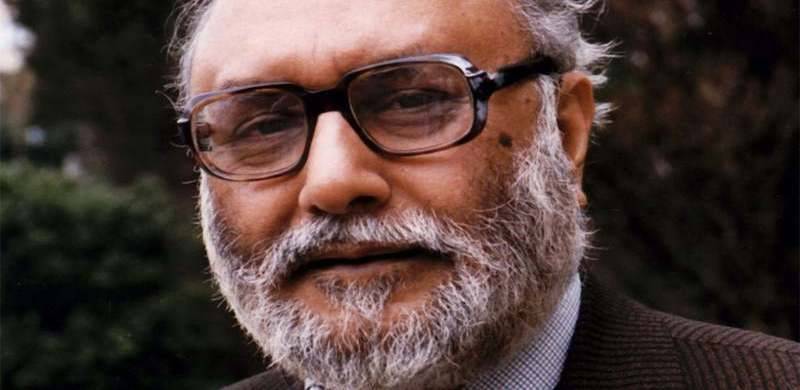
Pakistan first Nobel Laureate, Dr Abdus Salam, played an important role in the preliminary stages of Pakistan’s nuclear programme and was instrumental in getting China on board for helping Pakistan build its nuclear weapons.
In an article in Dawn by Pervez Hoodbhoy, he cites a paper by Chinese physicists titled ‘Abdus Salam and China Abdus Salam and China - A View on Salam’s Influence on China’s Science Development Based on His Six Visits to China’. The paper reveals Salam's efforts to convince China to help Pakistan get nuclear weapons and is based on transcripts of meetings held at the Chinese Academy of Sciences.
The paper has revealed Salam’s efforts to get China to give help to Pakistan for its nuclear weapon programme. Salam paid six visits to China to meet Chinese leaders in the 1950s. When Salam went to China for the first time in 1958, he was with accompanied President Ayub Khan and met Chinese leader Zhou Enlai. However, at that time, no efforts were made regarding convincing China to help Pakistan in getting nuclear power. General Ayub was not interested in nuclear weapons and China had not joined the nuclear club.
However, things changed after East Pakistan separated from Pakistan in 1971. Following the break-up, the famous Multan meeting was held by the then president Zulfiqar Bhutto, where he appealed to scientists to make a bomb. Abdus Salam was present at that meeting.
According to the paper, Bhutto sent Dr Abdus Salam to China in 1972 to seek China’s help in getting nuclear weapons technology. Subsequently, Salam made a request about nuclear assistance to Chinese premier Zhou Enlai.
Enlai responded that the Chinese Academy of Sciences needed to study the proposal and would be sending people over to Pakistan for technology.
Hoodbhoy cites another article by Dr Yangyeng Cheng of Cornell University, which says that a couple of months after Salam’s visit, a Chinese team attended the opening ceremony of Karachi Nuclear Power Plant.
Salam started making efforts for Pakistan to get a nuclear bomb. He directed a student of his, Riazuddin, who would later go on to found the physics department at Quaid-e-Azam University, to form a group of theoreticians to understand the physics of nuclear implosions. This was agreed to by Pakistan Atomic Energy Commission chairman Munir Ahmad Khan.
In 1974, Salam received shock and disappointment when the Ahmadi community to which he belonged to was declared non-Muslim by Zulfiqar Ali Bhutto’s government.
Afterwards, Salam’s attitude towards nuclear weapons changed, and he later started viewing the atomic bomb as an existential threat to humankind.
Moreover, Hoodbhoy also argues against the notion that Salam gave away Pakistan’s nuclear secrets to other countries. He said that this was a lie put forth by the same people who actually partook in such acts and were later exposed. He further supports his point by saying that Salam knew no technical secrets of the bomb’s development work.
In an article in Dawn by Pervez Hoodbhoy, he cites a paper by Chinese physicists titled ‘Abdus Salam and China Abdus Salam and China - A View on Salam’s Influence on China’s Science Development Based on His Six Visits to China’. The paper reveals Salam's efforts to convince China to help Pakistan get nuclear weapons and is based on transcripts of meetings held at the Chinese Academy of Sciences.
The paper has revealed Salam’s efforts to get China to give help to Pakistan for its nuclear weapon programme. Salam paid six visits to China to meet Chinese leaders in the 1950s. When Salam went to China for the first time in 1958, he was with accompanied President Ayub Khan and met Chinese leader Zhou Enlai. However, at that time, no efforts were made regarding convincing China to help Pakistan in getting nuclear power. General Ayub was not interested in nuclear weapons and China had not joined the nuclear club.
However, things changed after East Pakistan separated from Pakistan in 1971. Following the break-up, the famous Multan meeting was held by the then president Zulfiqar Bhutto, where he appealed to scientists to make a bomb. Abdus Salam was present at that meeting.
According to the paper, Bhutto sent Dr Abdus Salam to China in 1972 to seek China’s help in getting nuclear weapons technology. Subsequently, Salam made a request about nuclear assistance to Chinese premier Zhou Enlai.
Enlai responded that the Chinese Academy of Sciences needed to study the proposal and would be sending people over to Pakistan for technology.
Hoodbhoy cites another article by Dr Yangyeng Cheng of Cornell University, which says that a couple of months after Salam’s visit, a Chinese team attended the opening ceremony of Karachi Nuclear Power Plant.
Salam started making efforts for Pakistan to get a nuclear bomb. He directed a student of his, Riazuddin, who would later go on to found the physics department at Quaid-e-Azam University, to form a group of theoreticians to understand the physics of nuclear implosions. This was agreed to by Pakistan Atomic Energy Commission chairman Munir Ahmad Khan.
In 1974, Salam received shock and disappointment when the Ahmadi community to which he belonged to was declared non-Muslim by Zulfiqar Ali Bhutto’s government.
Afterwards, Salam’s attitude towards nuclear weapons changed, and he later started viewing the atomic bomb as an existential threat to humankind.
Moreover, Hoodbhoy also argues against the notion that Salam gave away Pakistan’s nuclear secrets to other countries. He said that this was a lie put forth by the same people who actually partook in such acts and were later exposed. He further supports his point by saying that Salam knew no technical secrets of the bomb’s development work.
